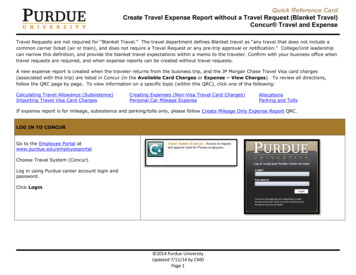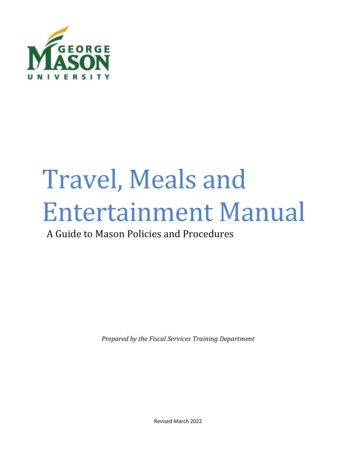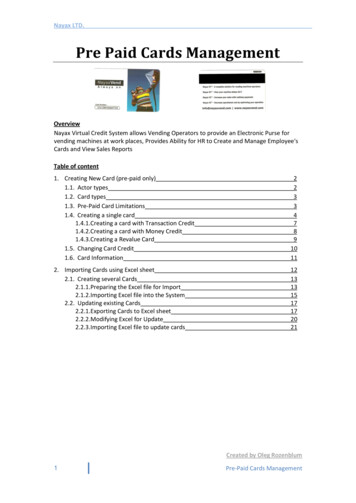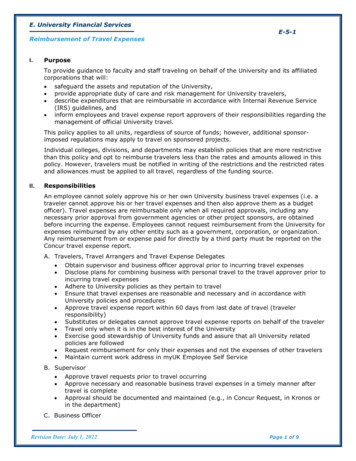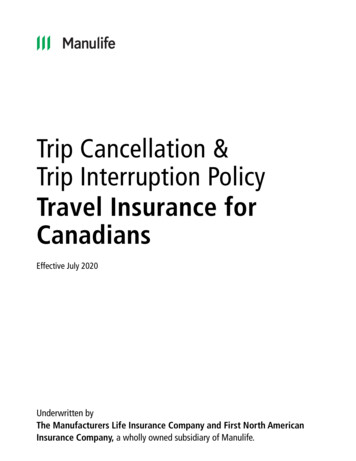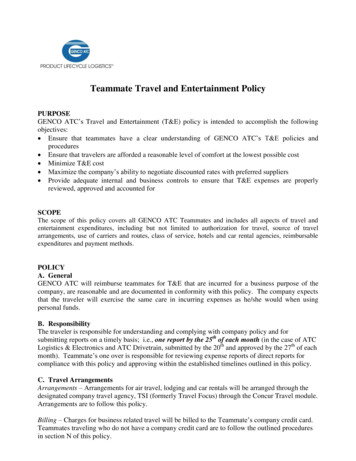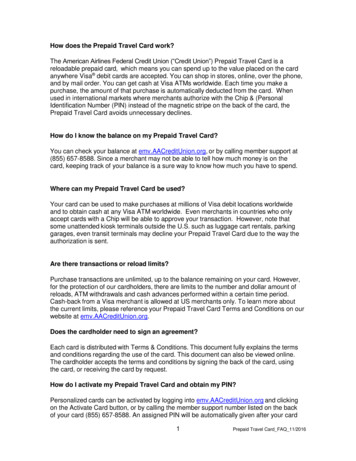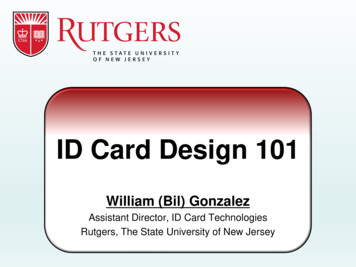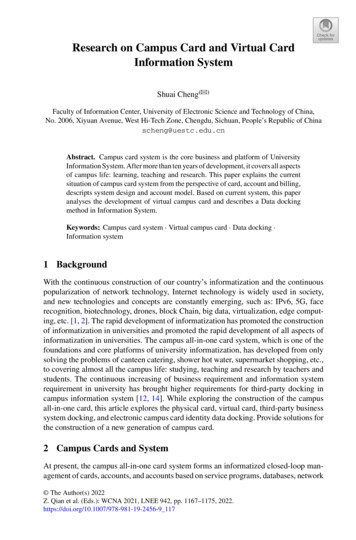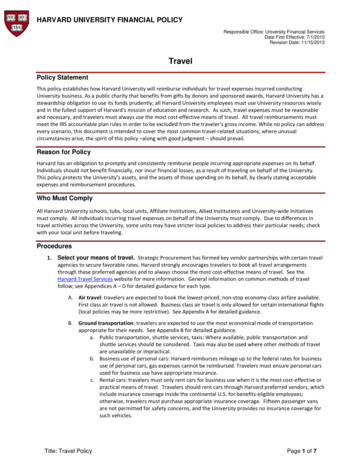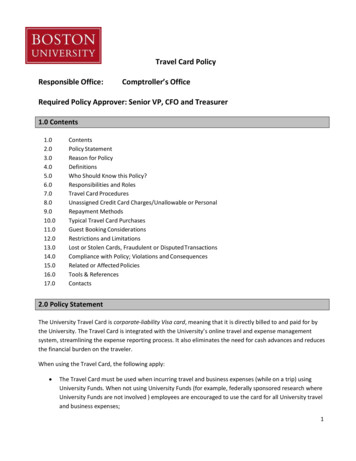
Transcription
Travel Card PolicyResponsible Office:Comptroller’s OfficeRequired Policy Approver: Senior VP, CFO and Treasurer1.0 014.015.016.017.0ContentsPolicy StatementReason for PolicyDefinitionsWho Should Know this Policy?Responsibilities and RolesTravel Card ProceduresUnassigned Credit Card Charges/Unallowable or PersonalRepayment MethodsTypical Travel Card PurchasesGuest Booking ConsiderationsRestrictions and LimitationsLost or Stolen Cards, Fraudulent or Disputed TransactionsCompliance with Policy; Violations and ConsequencesRelated or Affected PoliciesTools & ReferencesContacts2.0 Policy StatementThe University Travel Card is corporate-liability Visa card, meaning that it is directly billed to and paid for bythe University. The Travel Card is integrated with the University’s online travel and expense managementsystem, streamlining the expense reporting process. It also eliminates the need for cash advances and reducesthe financial burden on the traveler.When using the Travel Card, the following apply: The Travel Card must be used when incurring travel and business expenses (while on a trip) usingUniversity Funds. When not using University Funds (for example, federally sponsored research whereUniversity Funds are not involved ) employees are encouraged to use the card for all University traveland business expenses;1
Full-Time faculty and staff (paid through the University’s payroll system) who anticipate traveling onbehalf of the University are eligible to apply for the Travel Card with supervisor approval; The Travel Card may only be used for appropriate and allocable expenses as defined in the UniversityTravel & Business Expense Policy (in addition to any other school/departmental policies, if applicable); The Cardholder must review card charges in the expense management system in a timely manner andnotify US Bank and the Travel Card Administrator immediately should any fraudulent changes bedetected. Once applicable credits and refunds have been issued the card holder should complete anexpense report to clear fraudulent transactions. Approvers and Financial Approvers have oversight over a cardholder’s access to and use of the TravelCard; this includes the application process, reviewing and approving card charges for policycompliance, and ensuring that charges are reconciled in a timely manner; Any identified fraudulent charges must be reported to US Bank and the Travel Card Administratorimmediately; Personal charges are allowed on the Travel Card only to the extent they cannot be easily separatedfrom a University expense; any personal charges incurred on the card must be itemized and marked as“personal” in the expense management system and will be reimbursed by the traveler to theUniversity via payroll deduction. Cardholders must complete mandatory Travel Card training before a card can be issued; Cardholder and/or Approver must notify the Travel Card Administrator in advance (or as soon aspossible) whenever a cardholder is terminated or transferred to a different department.3.0 Reason for PolicyUsing the University Travel Card reduces the time and effort involved in the expense reporting processfor the employee, automates the approval process, and improves before and after-the-fact reportingon University travel destinations and vendors. Improved reporting helps the University to locatetravelers in the event of an emergency, assists with IRS required reporting about foreign activities, andstrengthens the University’s negotiating position for improved pricing and services with travel vendors.This policy and related procedures are designed to ensure that expenses on the Card are subject toappropriate review and approval, are reported and posted to the University’s books and recordsaccurately and timely, that personal charges and unspent advances are appropriately reimbursed tothe University, that processes are in place to prevent misuse of the card, and that should fraudulentcharges result, they are detected and reported timely.2
4.0 Definitions“Ancillary” PersonalExpenseExpense ManagementSystemFinancial ApproverApproverUniversity Funds“Ancillary” personal expenses are personal expenses incurred whenmaking a purchase that is primarily for Boston University businesspurposes, and when the personal portion of the expense cannot beeasily separated from the business portion when incurring theexpense. A personal side trip that is part of an airline ticketpurchased to attend a conference, or a rental car arrangement thatincludes some personal mileage, are examples of ancillary personalexpenses.Electronic tool that is used by Boston University to automate thereporting, approving, and processing of travel and business expensereports. Currently, the tool being used is Concur Travel and Expense.All charges incurred by the Cardholder are automatically uploaded tothis system to facilitate the expense reporting process.Individual assigned as the financial cost object approver in SAP(Financial Accounting) for a school/college/unit cost center. Thisperson is responsible for completing a secondary approval for TravelCard applications. See “Roles and Responsibilities” section for moredetail.Individual assigned as an employee’s direct supervisor in SAP (HumanCapital Management). For any direct reports completing an expensereport, this person is responsible for reviewing and approving TravelCard applications. See “Roles and Responsibilities” section for moredetail.Any funds that are directly provided and administered by theUniversity (e.g. endowment funds, gifts, general budget funds, anddiscretionary funds provided from University sources). Universityfunds do not include those that are provided to Boston University bya sponsoring agency and allocated to a principal investigator ormember of the faculty (e.g. federal sponsored/corporate grant).5.0 Who Should Know This Policy?Travel Cardholders, Approvers, Departmental Financial Administrators, Accounts Payable, TravelServices Department and Internal Audit should understand this policy. The Comptroller’s Office isresponsible for compliance and the management of the card program and policy.3
6.0 Responsibilities and RolesA. Schools, Colleges, Units and DepartmentsSchools, Colleges, Units and Departments have an important role in monitoring overall compliance with theTravel Card Policy (and the Travel and Business Expense Policy), to ensure that travel and businessexpenses (including those charged to the card) are reasonable in nature. These responsibilities includeconfirming that authorized individual approvers are appropriate based on the employee’s role andassigned duties.Schools, Colleges and Departments may impose more (not less) stringent controls over travel and businessexpenses than those required by this policy and are responsible for communicating and implementing anyadditional controls.B. CardholdersEach Cardholder must: Complete mandatory training administered by Travel Services prior to the issuance of a Travel Card.Travel Card training is hosted on the Travel Services website; Purchase travel arrangements and related incidentals in accordance with the University Travel &Business Expense Policy. Spending should always be consistent with each employee’s responsibilityfor stewardship and safeguarding of University assets. Use of the Travel Card for purchases of certaincommodities identified in the “Restrictions and Limitations” section of this Policy is notallowed;Ensure that each card transaction is assigned to an Expense Report within 30 days of the transactiondate; expenses must be submitted within 30 days of the trip end date (or transaction date if chargesare incurred for a cancelled trip); Retain all original itemized receipts for card charges 25 or greater in accordance with the Travel &Business Expense Policy and attach them to the relevant transactions in the expense managementsystem for expense report submission and approval; Contact the Travel Card Administrator in writing to ensure that the most current information is onrecord (i.e., name change, address change, phone number, e-mail change, Approver change )C. ApproverEach Approver must: Review and approve all Travel Card applications from direct reports, ensuring that card limits arereasonable based on intended travel needs of the Cardholder; Review and approve all cardholder expense reports in the expense management system in atimely manner (generally within 7 days of report submission by direct report). Delegation of4
Travel Card approval authority is not allowed without written approval of the employee’sApprover; the delegated approver should know the travel card and travel policies and have theknowledge and judgment to approve card transactions; the delegated approver cannot be anindividual who reports to the cardholder and cannot be the cardholder. Review and approve cash advance requests on “Cash Advance Request Form” Work with departmental Financial Approver and Cardholder to reconcile any unassigned cardcharges based on the parameters of this policy (see “Unassigned Card Charges” section)As part of the review of the Cardholder’s travel and business expense transactions (including those on the TravelCard), the Approver shall identify instances of misuse of the Travel Card. Instances of suspected non-ancillarypersonal or fraudulent use should be reported to the Travel Card Administrator as soon as they are identifiedfor investigation and remediation. Training for Approvers is strongly recommended and encouraged. Prior toissuance of the Travel Card, the Approver must become familiar with Travel Card policies and procedures.D. Financial ApproverEach Financial Approver must: Provide a secondary review of all Travel Card applications for Approver review and sign-off, includingensuring that card limits are reasonable based on expected travel needs of the Cardholder;Review and approve cash advance requests on “Cash Advance Request Form” (after Approver reviewsand approves request);Review monthly “Unassigned Card Charges” report distributed by the Travel Department and workwith Approvers to ensure that Cardholders reconcile all outstanding charges in a timely manner;Communicate any intended changes in Cardholder employment status to the Card ServicesDepartment in a timely mannerE. Travel Card Administrator (through Card Services Department) will: Provide oversight of the Travel Card program and maintain documentation for transactions for BostonUniversity. In the event the Financial Approver is unable to provide needed guidance, Cardholdersshould contact the Travel Card Administrator; Manage and evaluate the Travel Card program, reconcile the unassigned charges account and serveas a liaison between the University and US Bank;Create and maintain a list of active Cardholders for distribution to departments/schools as needed;Approve and initiate any departmental approved cash advances requested on the “Cash AdvanceRequest Form” (after Approver and Financial Approver review and signoff); Develop, coordinate, and provide training programs for Cardholders and Travel Card Approvers toensure that Cardholders and Approvers thoroughly understand, agree to, and abide by all businessrules, policies, and procedures that govern the usage of the University's Travel Card; Perform audits on any and all Travel Cardholder accounts at any time. These audits do not requireadvance notice and may be performed by the Travel Card Administrator and/or by Internal Audit.Audits are a combination of desk reviews of expense reports and meetings with cardholders to review5
receipts and related documentation; Provide departmental metrics/reporting to facilitate the evaluation of policy complianceF. US Bank will: Authorize purchases 24 hours a day, 365 days a year;Issue a temporary credit to the Cardholder’s account when notified of a questioned item. Thiscredit will appear on the University’s US Bank statement the month following US Bank notification.If the dispute is resolved in favor of the University, US Bank will issue a permanent credit to theaccount; Upon proper authorization, issue a new Travel Card in the event that a card in lost/stolen orexpires7.0 Travel Card ProceduresA. Cardholder Eligibility All potential cardholders must complete two forms to facilitate the approval process, including:oo Travel Card ApplicationResponsibility and Financial Liability AgreementWithin the limits of this Policy, University departments determine who is eligible to possess a TravelCard. The Approver and Financial Approver must sign off on the cardholder’s Travel CardApplication.oOnly full-time faculty and staff (paid through the University’s payroll system) whoanticipate traveling on behalf of the University are eligible to apply for the travel card.Student employees are not eligible to hold a Travel Card. Prior to the issuance of a Travel Card, the Cardholder must complete mandatory training administeredby the Travel Card Administrator. Prior to the issuance of a Travel Card, the Approver and Financial Approver must sign-off on theCardholder’s “Travel Card Application” and collect the “Responsibility and Financial Liability Agreement”signed by the Cardholder. These forms must be provided to the Travel Card Administrator to facilitatethe card acquisition process with US Bank.B. Credit LimitsEach Cardholder has a specific monthly credit limit based on expected travel for University businesspurposes. In unusual circumstances and for legitimate business reasons, the monthly limit can beadjusted by the Travel Card Administrator with the written approval of the Approver and FinancialApprover.Card limits available in the application include:6
CategoryLevel 1Level 2Level 3Level 4DescriptionInfrequent Travel(1-2 trips per fiscal year)Moderate Travel (Domestic) – 3-10trips per fiscal year)Moderate Travel (Domestic andInternational) – 3-10 trips per yearHigh Travel(11 trips per fiscal year)MonthlyCredit Limit 2,500 5,000 7,500 10,000Monthly limits above 10,000 must have a valid business justification documented on the TravelCard Application and are subject to review by Financial Affairs.C. Making a Purchase - CardholdersStep 1Before making any purchase, ensure the purchase is consistent with your unit's guidelinesfor purchase approvals and that there are sufficient funds in the budget to support thepurchase. If the purchase is related to a sponsored award, verify that the items to bepurchased are allowable given the sponsor policies and the specific terms and conditions ofthe award. Refer to the sponsored award section of the Travel & Business Expense Policyfor more information.Step 2Inform the vendor that the Travel Card will be your payment method. Provide the card accountnumber and expiration date printed on the front and back of the card. You may also berequired to provide the card verification code which is located on the back of the card.Step 3Card charges should be reconciled as incurred in the expense management system tofacilitate the expense reporting process. All card charges are required to be assigned to anexpense report within 30 days of the charge transaction date (date in which expense wasincurred); the expense report must be submitted in the tool within 30 days of the trip enddate (or transaction date if charges are incurred for a cancelled trip).Step 4Original and itemized receipt documentation is required to be uploaded for all card charges of 25 or greater. See Travel & Business Expense Policy for detailed information related toreceipt documentation and retention requirements. All receipt documentation must beattached electronically to the related transaction in the expense management system viascan or photo if using the Concur smartphone mobile app. The mobile app currentlysupports all Apple, Android, and Blackberry devices.7
In order to prevent fraudulent activity, please review all receipt documentation prior to uploadand submission to ensure that personal and confidential information (i.e. full account numbers)is properly concealed. For example, it would be acceptable to use a black marker to cover fullcredit card account number information.Step 6Every month, click on the Expense tab in your user profile and scroll down to the “AvailableExpenses” section to ensure you do not have any unassigned credit card charges that falloutside the 30 day reporting window. Financial Approvers will receive a monthly “UnassignedCard Charges Report” from the Travel Department to monitor any unreconciled expenses.As outlined in the terms and conditions of the “Responsibility and Financial LiabilityAgreement , amounts identified by you in your travel or expense report as personal expensesor as unused cash advances must be repaid to the University for details, see Section 9.0.D. Lost ReceiptsIf the cardholder has lost a receipt and a duplicate cannot be obtained from the merchant, the cardholdermust use the “Missing Receipt Affidavit” feature in the expense management system when completing andsubmitting a travel expense report.E. Purchases Declined at the Point of SaleAlthough the supplier may accept the Travel Card for use, the purchase could be declined at the point ofsale. The following are possible reasons for a decline: The transaction amount exceeds established limitsThe transaction amount exceeds the remaining available balance of total monthly spending limitThe cardholder has not activated a newly assigned or renewed cardThe card has expired or has been terminatedThe cardholder or the merchant transposed the card account number during the exchange ofinformation. All cardholders should ensure that the merchant has received the correct number for thecorrect Travel Card to minimize the occurrence of this type of decline at the point of sale The merchant enters an incorrect expiration dateCardholders should contact the Travel Card Administrator to determine the reason a purchase was declinedat the point of sale.F. Card RenewalNew Travel Cards are automatically reissued to all active cardholders prior to the expiration date. The cardexpires on the last calendar day of the month listed on the card. Generally, Travel Cards are issued for athree-year period. Upon expiration, a renewal card is mailed directly to the cardholder. The cardholder is8
required to destroy the expired card prior to receiving the new card. If a cardholder does not receive a cardbefore the current one expires, contact US Bank for assistance. Cardholders are responsible for activatingrenewal cards.G. Credit Limit ChangeCardholders may request a change in credit limit from the original pre-set limit. Requests for changes maybe temporary or permanent. Requests for changes in credit limits must be in writing and be approved bythe Approver and Financial Approver. Once the appropriate approvals are obtained, all requests for creditlimit changes are directed to the Travel Card Administrator. It is strongly recommended that the Cardholderanticipate spending needs and initiate these requests in advance– generally at least fourteen (14) daysprior to trip departure.H. Replacement of Worn-Out/Defective CardsTo replace a card that is worn out or defective, the cardholder must contact U.S. Bank to request areplacement card. The replacement will be sent via Federal Express 2-day delivery direct to the address onfile. Because the requested card will have the same number as the one it is replacing it will be sent ACTIVEto prevent suspending spending privileges.I.Termination-Cancellation of CardA card may be terminated or cancelled when: The cardholder no longer uses the card The cardholder is no longer employed at Boston University The cardholder has not abided by the Travel Card policyTo close a Cardholder account, contact the Travel Card Administrator. When a Cardholder terminatesemployment with Boston University, the Cardholder has an obligation to surrender the Travel Card beforethe termination date, to assign any available charges (with appropriate receipt documentation) in theexpense management system to an expense report, and to submit all open reports for processing.The Approver and/or Financial Approver have the obligation to notify the Travel Card Administrator twoweeks before the employee’s end date to arrange for cancellation of the card, and should also work withthe employee to ensure all travel and expense reporting is complete.If a Cardholder transfers to a new department, the approver and/or Financial Approver must collect anddestroy the Travel Card. The Cardholder needs to fill out a new application form and obtain approval fromhis or her new department Approver and Financial Approver. Once the Approver and Financial Approverapprove the application, the completed form will be sent to the Travel Card Administrator. The Cardholder’sformer department Approver is responsible for ensuring that cards are returned and cancelled, as part of thestandard termination procedures.9
J.AdvancesIn general, the University does not provide cash advances. In the rare circumstance where an advance isneeded, and after receiving the required approvals, a Cardholder may use the Travel Card to obtain a cashadvance through an ATM. Advance requests must be approved by the Cardholder’s Supervisor, FinancialApprover, and the Travel Card Administrator on the Cash Advance Request Form. For the policy andprocedures related to travel advances, see “Travel Advances” section of the Travel and Business ExpensePolicy.When funds made available for an advance are withdrawn, these funds will be reflected automatically in theCardholder’s expense report and the Cardholder will be required to provide itemized receipts showing how theadvance was spent within 30 days of returning from the trip. Any advanced amount not spent should beclassified as Expense Type “Cash Advance Return” and will be deducted from any other funds due to theCardholder. Any amount remaining resulting from an unused travel advance identified by the employee mustbe repaid to the University. Mechanisms for repayment are described in Section 9.0 of this policy.8.0 Unassigned Charges / Timely Report Submissions / Personal ChargesUnassigned ChargesAll card transactions must be assigned to an expense report within 30 days of the transaction date,regardless of when the Cardholder returns from a trip. All charges are required to be assigned, documentedand approved in the expense management system within 30 days of the trip end date (or from transactiondate if charges relate to a cancelled trip). For any charges that are not assigned within an expense report,Cardholder will be notified via email to assign andprocess transactions in the expense managementsystemWithin 45 days of transaction dateNotification will be sent to Cardholder and FinancialApprover requesting that all transactions beassigned and processed in the ExpenseManagement Tool.Within 60 days of transaction dateNotification will be sent to appropriate Dean or VicePresident to escalate the issue (notification toPresident or Provost may be warranted in certaincircumstances)* Metrics on late travel reports and unassigned charges will be provided monthly to department andschool/college financial administrators.Within 30 days of transaction dateTransactions not assigned to an expense report within 60 days will be reviewed by the Travel Department,and the Cardholder’s Travel Card will be placed on “hold” status until charges are assigned. “Hold” statusmeans that new charges cannot be made using the Travel Card until the hold is released. After 120 days, as10
required by IRS Accountable Plan rules, these amounts will be considered taxable compensation to theemployee on Form W-2 and subject to the appropriate tax withholding.Timely Report SubmissionsTravel reports are required to be filed within 30 days after the end of each trip. Late filings of travel reportscontribute to inaccuracies in financial reporting, and make departmental and central management ofUniversity resources more difficult. To minimize late travel reports and the related negative consequences tothe employee and the University, the Travel Department commits to follow up weekly with employees whohave delinquent expenses of 30 days or more, and their supervisors.For reports delinquent by more than 60 days, a “hold” will be placed on the card. After 120 days as requiredby IRS Accountable Plan rules, these amounts will be considered taxable compensation to the employee onForm W-2 and subject to the appropriate tax withholding.Example: An employee travels on University business and charges airfare totaling 600 on the UniversityTravel Card for a trip ending on February 1. No travel report has been filed by March 1. The TravelDepartment reaches out to the employee and the supervisor on a weekly basis through April 1 with areminder to complete and submit the travel report promptly; if the employee does not respond and thereport is not submitted by April 1, the travel card will be placed on “hold” status. After June 1, the amountswill be charged to the department’s default cost center, will be considered taxable compensation to theemployee, and will be included on the employee’s Form W-2.Personal Expenses Charged to the Travel CardPersonal expenses are generally not allowed on the Travel Card. The only exception is for “ancillary”personal expenses. These are personal expenses incurred when making a purchase primarily for businesspurposes, when the personal portion of the expense cannot be easily separated from the business portionwhen incurring the expense. A personal side trip that is part of an airline ticket purchased to attend aconference, or a rental car arrangement that includes some personal mileage, are examples of ancillarypersonal expenses. Cardholders must use their own funds or a personal credit card to pay for personalexpenses that are easily separated from University expenses. Use of the University Travel Card for anypurchase that is 100% personal will be treated as a violation of University policy.Personal Expenses Flagged by EmployeeWhen completing an expense report for an expense that has both personal and business components, or apersonal expense that was inadvertently charged to the Travel Card, the personal portion charged to the cardshould be identified as “personal” in the expense management system, and will then be flagged as an amountdue back from the Cardholder to the University. If the total amount of “personal” expenses placed on theTravel Card is greater than the total due to the employee for out-of-pocket expenses, the employee will owethe University the difference. Mechanisms for repayment are described in Section 9.0 of this policy.11
Personal/Unallowable Expenses Not Flagged by EmployeeAmounts may be identified for additional review by the Travel Department or University auditors during anafter-the-fact audit or review, if charges originally treated as University expenses appear not to have beenvalid business expenses. This could be the result of an undetected error in filling out the form (an amountnot matching a receipt for an out-of-pocket expense, for example), an expense submitted twice in error, oran expense not allowed under University policy such as an unapproved upgrade. For such findings, the TravelDepartment will immediately notify the Cardholder and the respective school/department to verify or resolvethe finding. In the event the review establishes that the charges are not valid University expenses and theemployee agrees with this determination, the employee may be asked to authorize a reimbursement to theUniversity using one of the repayment methods noted in Section 9.0 of this policy.If the card charge appears to be fraudulent, see section 14 (part B), “Fraudulent and Non-Ancillary PersonalUse”, for steps that will be taken by the University.9.0 Repayment MethodsIf it is determined that funds are owed to the University as a result of personal expenses charged to theTravel Card, unused travel advances, or charges determined not to be valid during an audit or review asdescribed in Section 8.0 of this policy, and the employee is in agreement that these funds are owed, theemployee will be given the option to select one of the following repayment methods to reimburse theUniversity for funds owed:1. Deduct the full amount from employee’s next regularly scheduled paycheck. (One-time SalaryDeduction)2. Deduct 50% of amount from employee’s next two (2) regularly scheduled paychecks. (Partial SalaryDeduction)3. Payment by personal check (payable to Boston University)10.0 Typical Travel Card PurchasesTypical Purchases Made by Cardholders Travel transportation (airfare, car rental, train, taxi, etc.)AccommodationsMeals, including business mealsIncidentalsConference registration fees and related travel transportation/accommodationsPassport/visa feesFor a list of common travel-related expenses, see the Travel & Business Expense Policy. The Travel Card shouldbe used for all expenses incurred on a trip with the exception of cash-only transactions, such as tips andgratuities.12
11.0 Guest Booking ConsiderationsCardholders will have the option to book for Guests either via Cliqbook, Concur’s online booking tool, or withany other agency or web-based reservation service where VISA is accepted. In Concur, users will have a “bookfor a guest” option under the Travel tab. All reservations/bookings for guests and visitors will be associatedwith, and charged to, the individual’s Travel Card. These card transactions will be linked with and expensedthough the Cardholder’s Concur profile. If a department has a need to reimburse a Guest for out-of-pocketexpenses they should contact the Travel Department.12.0 Restrictions and LimitationsThis chart will help you understand when it is most appropriate to use your Travel Card versus when thePcard is more appropriate.Expense TypeTravel CardTaxi to/from Airport Local
reporting, approving, and processing of travel and business expense reports. Currently, the tool being used is Concur Travel and Expense. All charges incurred by the Cardholder are automatically uploaded to this system to facilitate the expense reporting process. Financial Approver Individual assigned as the financial cost object approver in SAP
